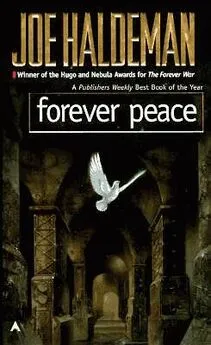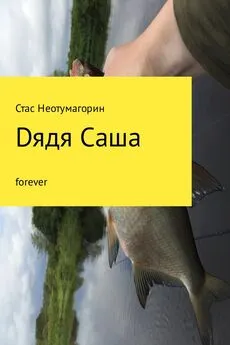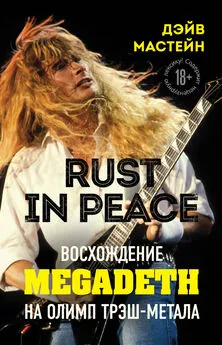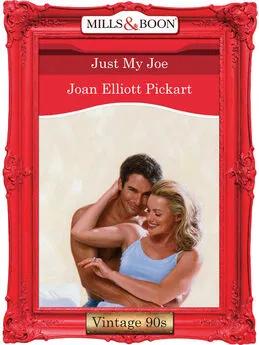Joe Haldeman - Forever Peace
- Название:Forever Peace
- Автор:
- Жанр:
- Издательство:неизвестно
- Год:неизвестен
- ISBN:нет данных
- Рейтинг:
- Избранное:Добавить в избранное
-
Отзывы:
-
Ваша оценка:
Joe Haldeman - Forever Peace краткое содержание
Copyright © Joe Haldeman 1997
Version 1.0
1998 Hugo Award Winner
1999 Nebula Award Winner
This novel is for two editors: John W. Campbell, who rejected a story because he thought it was absurd to write about American women who fight and die in combat, and Ben Bova, who didn't.
Caveat lector: This book is not a continuation of my 1975 novel The Forever War. From the author's point of view it is a kind of sequel, though, examining some of that novel's problems from an angle that didn't exist twenty years ago.
Forever Peace - читать онлайн бесплатно полную версию (весь текст целиком)
Интервал:
Закладка:
"Yoo-hoo. Julian? Anybody home?" It was Reza, from the other table.
"Sorry. Thinking."
"Well, come over here and think. We have a physics question that Blaze can't answer."
I picked up my drink and moved over. "Not particle, then."
"No, it's simpler than that. Why does water emptying out of a tub go one direction in the Northern Hemisphere and the other in the Southern?"
I looked at Amelia and she nodded seriously. She knew the answer, and Reza probably did, too. They were rescuing me from the war talk.
"That's easy. Water molecules are magnetized. They always point north or south."
"Nonsense," Belda said. "Even I would know it if water were magnetized."
"The truth is that it's an old wives' tale. You'll excuse the expression."
"I'm an old widow," Belda said.
"Water goes one way or the other depending on the size and shape of the tub, and peculiarities of the surface near the outlet. People go through life believing the hemisphere thing without noticing that some of the basins in their own house go the wrong way."
"I must go home and check," Belda said. She drained her glass and unfolded slowly out of the chair. "You children be good." She went to say good-bye to the others.
Reza smiled at her back. "She thought you looked lonely there."
"Sad," Amelia said. "I did, too. Such a horrible experience, and here we are bringing it up all over."
"It's not something they covered in training. I mean, in a way they do. You get jacked to strings recorded while people died, first in a light jack and then deeper."
"Some jackfreaks do it for fun," Reza said.
"Yeah, well, they can have my job."
"I've seen that billboard." Amelia hugged herself.
"Strings of people dying in racing accidents. Executions."
"The under-the-counter ones are worse." Ralph had tried a couple, so I'd felt them secondhand. "Our backups who died, their strings are probably on the market by now."
"The government can't – "
"Oh, the government loves it," Reza broke in. "They probably have some recruitment division that makes sure the stores are full of snuff strings."
"I don't know," I said. "Army's not wild about people who are already jacked."
"Ralph was," Amelia said.
"He had other virtues. They'd rather have you associate the specialness of being jacked with being in the army."
"Sounds really special," Reza said. "Somebody dies and you feel his pain? I'd rather – "
"You don't understand, Rez. You get larger in a way, when somebody dies. You share it and" – the memory of Carolyn suddenly hit me hard – "well, it makes your own death less earthshaking. Someday you'll buy it. Big deal."
"You live on? I mean, they live on, in you?"
"Some do, some don't. You've met people you'd never want to carry around in your head. Those guys die the day they die."
"But you'll have Carolyn forever," Amelia said.
I paused a little too long. "Of course. And after I die, the people who've been jacked to me will remember her too, and pass her down."
"I wish you wouldn't talk like that," Amelia said. Rez, who had known for years that we were together, nodded. "It's like a boil you keep picking at, like you were getting ready to die all the time."
I almost lost it. I literally counted to ten. Rez opened his mouth but I interrupted. "Would you rather I just watched people die, felt them die, and came home asking 'What's for dinner?'" I dropped to a whisper. "How would you feel about me if that didn't hurt me?"
"I'm sorry."
"Don't. I'm sorry you lost a baby. But that's not what you are. We go through these things, and then we more or less absorb them, and we become whatever we are becoming."
"Julian," Reza said in a warning tone, "perhaps you ought to save this for later?"
"That's a good idea," Amelia said, rising. "I have to go on home anyhow." She signaled the wheelie and it went for her coat and bag.
"Share a cab?" I asked.
"It's not necessary," she said in a neutral tone. "End of the month." She could use leftover entertainment points for a cab ride.
Other people didn't have points left over, so I bought a lot of wine and beer and whiskey, and drank more than my share. Reza did, too; his car wouldn't let him drive. He came along with me and my two bodyguard shoes.
I had them drop me at the campus gate, and walked the two kilometers to Amelia's through a cool mist of rain. No sign of any newsies.
All the lights were out; it was almost two. I let myself in through the back and belatedly thought I should have buzzed. What if she wasn't alone?
I turned on the kitchen light and harvested cheese and grape juice from the refrigerator. She heard me moving around and shuffled in, rubbing her eyes. "No reporters?" I asked.
"They're all under the bed."
She stood behind me and put her hands on my shoulders. "Give them something to write about?" I turned around in the chair and buried my face between her breasts. Her skin had a warm, sleepy smell.
"I'm sorry about earlier."
"You've been through too much. Come on." I let her lead me into the bedroom and she undressed me like a child. I was still a little drunk, but she had ways of getting around that, mostly patience, but other things, too.
I slept like a creature stunned and woke to an empty house. She'd left a note on the microwave that she had a sequence scheduled at 8:45 and would see me at the lunch group meeting. It was after ten.
A Saturday meeting; science never sleeps. I found some clean clothes in "my" drawer and took a quick shower.
THE DAY BEFORE I went back to Portobello, I had an appointment with the Luxury Allocation Board in Dallas, the people who handle special requests for the nano-forge. I took the Triangle monorail, and so got a glimpse of Fort Worth streaming by. I'd never gotten off there.
It was a half hour to Dallas, but then another hour crawling through traffic out to the LAB, which took up a huge piece of land outside the city limits. They had sixteen nanoforges, and hundreds of tanks and vats and bins that held the raw materials and the various nanos that put them together in millions of ways. I didn't have time to walk around, but had taken a guided tour of the place with Reza and his friend, the year before. That's when I got the idea to get something special for Amelia. We didn't do birthdays or religious holidays, but next week was the second anniversary of the first time we were intimate. (I don't keep a diary, but could trace the date down through lab reports; we both missed the next day's sequence.)
The evaluator assigned to my request was a sour-faced man, about fifty. He read the form with a fixed glum expression. "You don't want this piece of jewelry for yourself. This is for some woman, some lover?"
"Yes, of course."
"I'll have to have her name, then."
I hesitated. "She's not exactly my – "
"I don't care about your relationship. I just have to know who will eventually own this object. If I should approve it."
I wasn't enthusiastic about having our relationship officially documented. Of course anyone who tapped me with a deep jack would know about it, so it was only as secret as anything in my life was secret.
"It's for Amelia Blaze Harding," I said. "A co-worker."
He wrote that down. "She also lives at the university?"
"That's right."
"Same address?"
"No. I'm not sure what her address is."
"We'll find it." He smiled like a man who had sucked on a lemon and tried to smile. "I see no reason to disapprove your request." A printer in his desk hissed and a piece of paper flipped up in front of me.
"That will be fifty-three utility credits," he said. "If you sign here, the finished piece should be available at Unit Six within half an hour."
I signed. More than a month's worth of credits for a handful of sand transformed was one way to think of it. Or fifty-three worthless government counters for a thing of beauty that would have been literally beyond price a generation ago.
I went out into the corridor and followed a purple line that led to Units 1 through 8. That split, and I followed a red line to Units 5 through 8. Door after door concealing people who sat at desks slowly doing work that machines could have done better and faster. But machines had no use for extra utility and entertainment credits.
I went through a revolving door into a pleasant rotunda built around a rock garden. A thin silvery stream fell and washed through it, splashing among exotic tropical plants that grew out of a gravel of rubies, diamonds, emeralds, and dozens of glittering stones with no common names.
I checked at the Unit 6 counter and it said I still had a half-hour wait. There was a cafe, though, with tables ringed around half the rock garden. I produced my military ID and got a cold beer. At the table where I sat, somebody had left a folded-up copy of the Mexican magazine Sexo!, so I spent the half hour improving my language skills.
A card on the table explained that the gems were specimens rejected for esthetic or structural flaws. They were nevertheless well out of reach.
The desk announced my name and I went over and picked up a small white package. I unwrapped it carefully.
It was exactly what I had ordered, but seemed more dramatic than its picture. A gold chain necklace supporting a dark green nightstone inside a halo of small rubies. Nightstones had only been around for a few months. This one looked like a small egg of onyx that somehow had a green light imbedded. As you turned it, the green changed shape, square to diamond to cross.
It would look good on her delicate skin, the red and green echoing her hair and eyes. I hoped it wouldn't be too exotic for her to wear.
On the train ride back, I showed it to a woman who sat next to me. She said it was pretty, but in her opinion was too dark for a black woman's skin. I told her I'd have to think about that.
I left it on Amelia's dresser, along with a note reminding her it was two years, and went on to Portobello.
JULIAN WAS BORN IN a university town, and grew up surrounded by white people who weren't overtly racist. There were race riots in places like Detroit and Miami, but people treated them as urban problems, far removed from their comfortable reality. That was close to the truth.
But the Ngumi War was changing white America's feelings about race-or, cynics maintained, allowing them to express their true feelings. Only about half the enemy were black, but most of the leaders who appeared on the news were from that half. And they were shown crying out for white blood.
The irony wasn't lost on Julian, that he was an active part of a process that was turning American whites against blacks. But that kind of white person was alien to his personal world, his daily life; the woman on the train literally came from a foreign land. The people in his university life were mostly white but color-blind, and the people he jacked with might have started out otherwise, but didn't stay racist: you couldn't think black people were inferior if you lived inside black skin, ten days every month.
OUR FIRST ASSIGNMENT HAD a lot of potential to turn ugly. We had to "remand for questioning" – kidnap – a woman who was suspected of being a rebel leader. She was also the mayor of San Ignacio, a small town high in the cloud forest.
The town was so small that any two of us could have destroyed it in minutes. We circled it in a silent flyboy, studying the infrared signature and comparing that to maps and low-orbit pictures. The town was lightly defended, apparently; ambushes set on the main road where it entered and left the town. Of course there could be automated defenses that didn't betray themselves with body heat. But it wasn't that rich a town.
Читать дальшеИнтервал:
Закладка:









